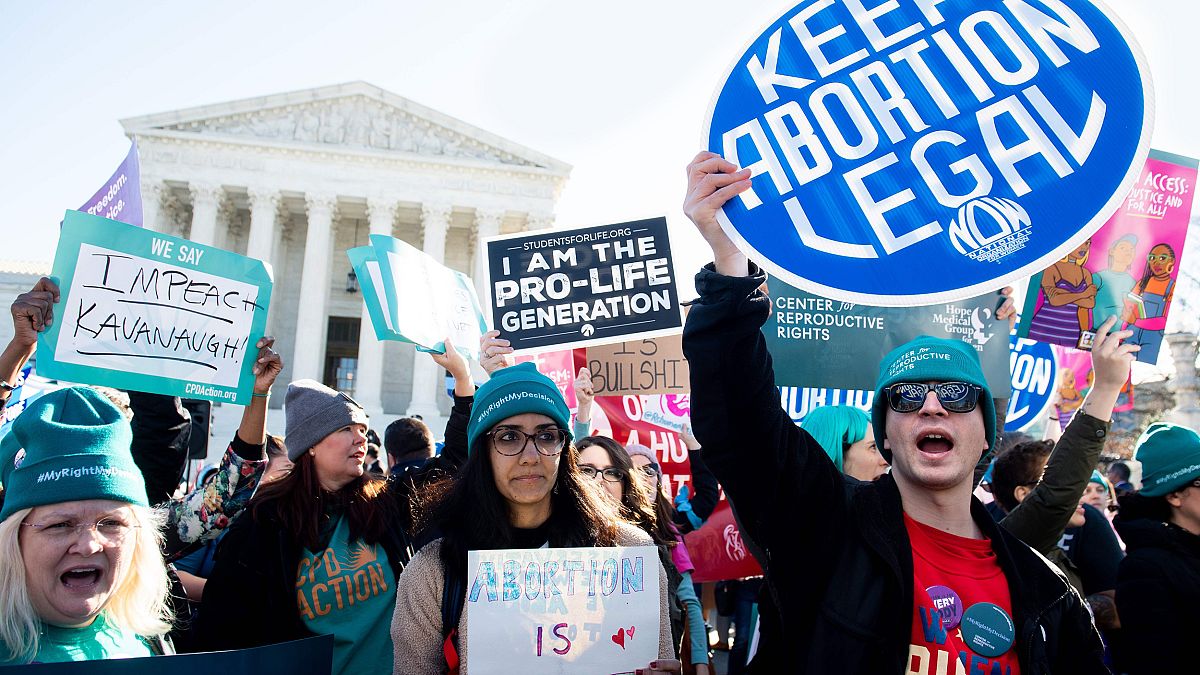With a crowd of demonstrators outside the court, the justices heard the first major abortion case since the retirement of Anthony Kennedy, who supported Roe v Wade.
WASHINGTON — An apparently divided U.S. Supreme Court struggled Wednesday to decide whether Louisiana's tough new restriction on abortion violates the Constitution.
With a large crowd of demonstrators outside the court, the justices heard the first major abortion case to reach them since the retirement of Anthony Kennedy, who supported Roe v. Wade's guarantee of a right of access to abortion. He was replaced by the more conservative Brett Kavanaugh, appointed by President Donald Trump.
Louisiana's legislature enacted the law in 2014, requiring any doctor offering abortion services to have admitting privileges at a hospital within 30 miles. Two Louisiana doctors and a medical clinic sued to get the law overturned.
They said it would leave only one doctor at a single clinic to provide services for nearly 10,000 women who seek abortions in the state each year.
The challengers said the requirement was identical to a Texas law the Supreme Court struck down four years ago. With Justice Kennedy in the majority, the court ruled then that Texas imposed an obstacle on women seeking access to abortion services without providing them any medical benefits.
Chief Justice John Roberts, who may hold the deciding vote, asked if the question about potential benefits to such a requirement could vary around the nation. "Could the results be different in different states?" he asked.
It was impossible to tell whether he was signaling that the court could uphold the Louisiana law, despite striking down the Texas law, or whether he thought all similar laws would be unconstitutional and that the court was bound by the earlier decision.
Kavanaugh seemed interested in the same issue, asking, "Are you saying an admitting privileges requirement is always unconstitutional, so you don't have to look at the facts in each case?"
Julie Rikelman, litigation director at the Center for Reproductive Rights, urged the court to follow the Texas result. "This is about respect for the court's precedents."
She said the burdens on access to abortion in Louisiana would be worse than those under the Texas law, which forced about half that state's abortion clinics to close. She also said the law was unnecessary, because only a small fraction of women experience medical problems after an abortion and seek treatment at a hospital near where they live, not one near the medical clinic.
Justice Ruth Bader Ginsburg challenged Louisiana's solicitor general, Elizabeth Murrill, on that point.
"Most abortions don't require hospitalization and when they do, the patient will be at home, not near the clinic," she said. "A first trimester abortion is among the safest kinds of surgeries, even safer than childbirth."
But Murrill said requiring an association with a nearby hospital provides a needed check on a doctor's credentials. "Louisiana's decision to pass this law was justified by evidence of health and safety violations at abortion clinics."
She also said some qualified doctors who couldn't get hospital admitting privileges just didn't try hard enough.
Louisiana and the Trump administration had also urged the Supreme Court to throw the lawsuit out, arguing that doctors and clinics have no legal right to sue on behalf of their patients. Justice Samuel Alito seemed to agree, but few of the other justices showed interest in that argument.
Justice Stephen Breyer said such a position would require overturning eight prior abortion rights decisions stemming from lawsuits filed by doctors on behalf of their patients.
Murrill also said requiring an association with a nearby hospital provides a needed check on a doctor's credentials. But Rikelman said a hospital's decision about whether to grant admitting privileges has little to do with a doctor's competence and more to do with whether the doctor will admit a sufficient number of patients.
A federal judge ruled in 2017 that the law was likely unconstitutional and blocked its enforcement. But a three-judge panel of the Fifth Circuit Court of Appeals voted to lift the stay. In a 2-1 ruling, the court said Louisiana's law would present far less of an obstacle than the Texas law would have. Less than one-third of Louisiana women seeking an abortion would face even the potential of longer wait times, the court said.
The appeals court concluded that the Louisiana law would not impose an "undue burden" on access to abortion, which has been the Supreme Court's key legal test for challenges to abortion restrictions for nearly three decades.
The court will issue a decision by late June.
